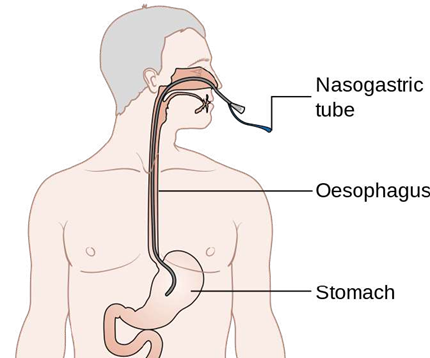What is the major extracellular (EC) electrolyte in the body?
Sodium.
Potassium.
Calcium.
Magnesium.
The Correct Answer is A

Sodium is the major extracellular electrolyte in the body.
It is responsible for maintaining the extracellular fluid volume, and also for regulation of the membrane potential of cells.
Sodium is exchanged along with potassium across cell membranes as part of active transport.
Choice B is wrong because potassium is mainly an intracellular ion.
It is important for nerve and muscle function, but it is not the predominant electrolyte in the extracellular fluid.
Choice C is wrong because calcium is not the major electrolyte in the extracellular fluid.
Calcium is mostly found in bones and teeth, where it forms a mineral reserve with phosphate.
Calcium also plays a role in muscle contraction, blood clotting, and enzyme activity.
Choice D is wrong because magnesium is not the major electrolyte in the extracellular fluid.
Magnesium is mostly found in bones, where it helps to stabilize the structure of ATP2.
Magnesium also participates in enzyme reactions, nerve and muscle function, and protein synthesis.
Nursing Test Bank
Naxlex Comprehensive Predictor Exams
Related Questions
Correct Answer is C
Explanation
This is because acute renal failure is a condition where the kidneys lose their ability to filter waste and excess fluid from the blood. This can lead to fluid overload, electrolyte imbalances, and metabolic acidosis. Therefore, the nurse should monitor the patient’s urine output and fluid balance to assess the severity of the renal impairment and prevent complications.
Choice A is wrong because administering a potassium-sparing diuretic would worsen the patient’s hyperkalemia, which is a common complication of acute renal failure.
Choice B is wrong because encouraging the patient to consume a high-sodium diet would increase the patient’s fluid retention and blood pressure, which can further damage the kidneys.
Choice D is wrong because administering intravenous antibiotics is not a priority intervention for acute renal failure unless there is a specific indication of infection.
Correct Answer is D
Explanation

Nasogastric suction removes gastric secretions that contain potassium, leading to a loss of potassium from the body. This can cause hypokalemia, which is a low level of potassium in the blood.
Choice A is wrong because Addison’s disease causes hyperkalemia, which is a high level of potassium in the blood.
Choice B is wrong because tissue damage can release potassium from the cells into the blood, causing hyperkalemia.
Choice C is wrong because uric acid level is not related to potassium level.
Uric acid is a waste product of purine metabolism that can cause gout or kidney stones if elevated.
Whether you are a student looking to ace your exams or a practicing nurse seeking to enhance your expertise , our nursing education contents will empower you with the confidence and competence to make a difference in the lives of patients and become a respected leader in the healthcare field.
Visit Naxlex, invest in your future and unlock endless possibilities with our unparalleled nursing education contents today
Report Wrong Answer on the Current Question
Do you disagree with the answer? If yes, what is your expected answer? Explain.
Kindly be descriptive with the issue you are facing.
